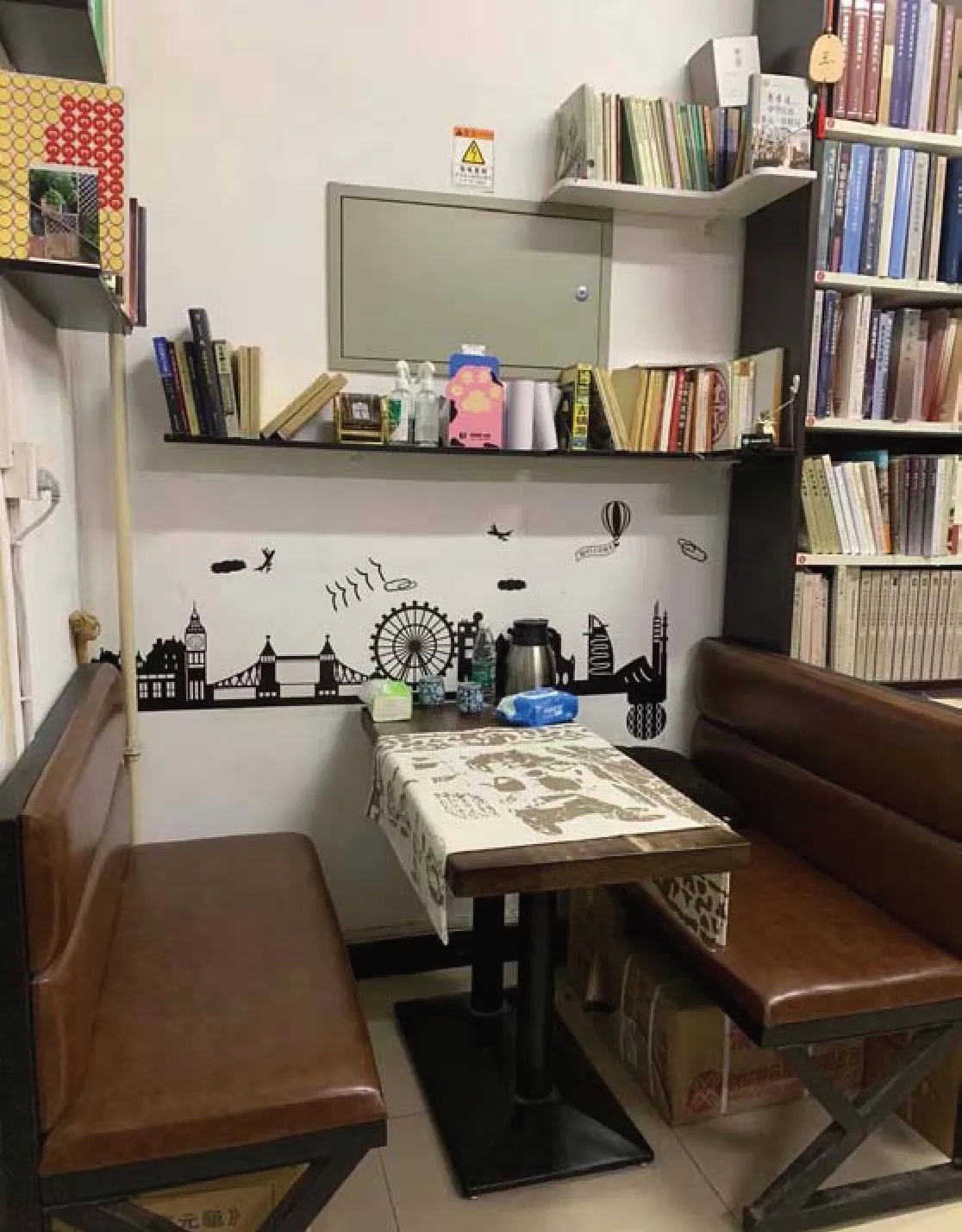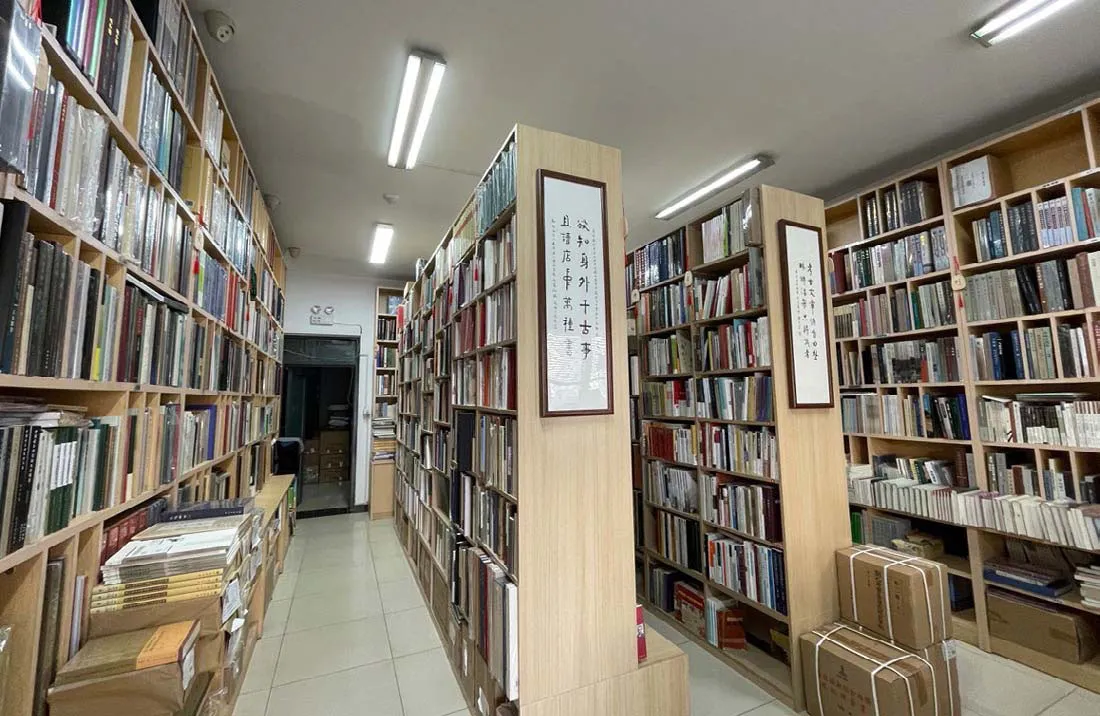Dedication and Persistence of an Archaeological Bookstore
By Qiu Hui

Hong Xia reads in the Humanistic Archaeology Bookstore.
Most first-time visitors to the Humanistic Archaeology Bookstore have to spend some time looking for it.Tucked deep in the narrow Sanhuqiao Hutong of Beijing’s Haidian District,the bookstore blends in harmoniously with the antiquated complex.Visitors have to drive very slowly and carefully to find the hidden gem.
Established in June 2012,the Humanistic Archaeology Bookstore boasts over 60,000 books in more than 10,000 categories,covering almost every kind of archaeological book.Hong Xia,manager of the bookstore,revealed that it is the country’s only independent bookstore dedicated to archaeology and museology.
However,it does not have good lighting nor offer reading space like a typical bookstore.It has only two rooms,which together cover about 120 square meters,and all its books are placed on a total of 103 bookshelves that stand floor-to-ceiling.The space between two bookshelves is so narrow that only a single person can fit through.Books are even kept under the reader’s chair,the lone chair the bookstore offers to readers.
The bookstore sometimes receives a few customers a day but is quiet most of the time,which has been normal for this brick-and-mortar bookstore since its opening 10 years ago.
A Niche Bookstore
Hong Xia has been working at the Humanistic Archaeology Bookstore for a decade including her time as an intern.She has become used to the quiet considering the bookstore receives no more than 1,000 customers in a year.
Therefore,many visitors wonder how such a bookshop survives.When the media reported on the bookstore in the winter of 2021,Hong answered that question with numbers: In 2021,the bookstore sold over 5 million yuan (US$699,000) worth of books,and the average salary for its employees was around 10,000 yuan (US$1,398) a month.
The good business performance caused many discussions both in the bookstore industry and among readers.“What is so surprising about that?” Hong still feels confused about the people’s response.
After the media coverage,many readers,media outlets,and even those living nearby became interested in the bookshop which began gaining popularity on the internet.Hong still remembers that during that period,the bookstore became quite crowded.It once welcomed over 30 visitors in its two rooms at once,far exceeding the space’s maximum capacity.
Some dropped in after shopping in the nearby markets,and many had never considered visiting the bookstore before the media reports.Once,a customer bought books worth 92 yuan and laid down a hundred yuan but didn’t wait for the change.The customer said “Carry on” to Hong and left.
“People come and go,and the popularity was only temporary,” said Hong.Some suggested she introduce some popular books and make the bookstore an online sensation to attract more visitors,but Hong has her reasons for doing things the way she does.
“Archaeological books are different from regular books because their contents are based on textual research,so the books are informative materials,” Hong noted,adding that when choosing which books are sold in a specialized bookstore,popular books with “hot-sale potential” should be intentionally excluded.“Because the opinions or theories in popular books may be invalid,” Hong explained.“People come to my bookstore for professional materials,so I have to be responsible to my customers.”
Some suggested Hong arrange an area in the bookstore to sell coffee,or sell books via livestream.“After the novelty wears off,people are still not going to come to the bookshop to buy books,”she said.“Moreover,it is impossible to explain an archaeological book in minutes,and would people buy a book that they do not understand?”Hong shakes her head at the idea.After 10 years,the bookstore already knows its targeted customers: students and researchers at universities,archaeological institutions,museums,and relevant sectors.
抗菌药说明书[适应症]不符合抗菌药说明书撰写技术指导原则的主要表现有:适应症没有按照“本品适用于治疗由对本品敏感的XXX、XXX和XXX菌引起的YYY病。”的规范描述;没有遵循“如果获得的证据仅仅支持用于较大人群的亚群(例如,疾病轻微的患者或特殊年龄组的患者)应予说明”的规定;没有遵循“在某些情况下有理由限制适应症,例如,建议药品不作为某种感染的一线治疗”应予描述的规定;遗漏使用限制的内容。
The bookstore has been visited by archeological gurus including Deng Cong,a professor at the Chinese University of Hong Kong,and Luo Tai,a professor at the Department of the History of Art of University of California.Hong commented that when she realizes an author came in,she asks for an autograph on one of their books.That is how she got the autograph of Wang Zijin,a famous expert on the Qin (221-206 BC) and Han (206 BC-AD 220) dynasties.
Survival and Development
Archaeology is not popular for most people,so archaeological bookstores are marginal.
Hong Xia,born in the 1980s,is the second manager of the bookstore.In 2017,she took over from An Yezhi,founder of the bookstore and wife of Xu Hong,an archaeologist.
Hong has witnessed the store’s development since its establishment.“It took 10 years for us to develop.” Hong was still a first-year graduate student at Capital Normal University when the bookstore opened,and she worked there as an intern.The bookstore is tucked in a residential area,so they first set the closing time at 9 p.m.thinking people living nearby could come by to read.But few wanted to drop in to browse their“hard sells.” To save costs,closing time was moved up to 6 p.m.
Almost all of the bookstore’s customers find the place after hearing about it from someone else.In 2013,its employees compiled a list of around 30,000 archaeological workers and nearly 300 archaeological organizations across the country.They sent them e-mails to introduce their books,but the efforts did not harvest immediate results.
That was the second year after the bookstore’s establishment,and Hong called it “the tough period.” Hong was responsible for the bookstore’s finances at the time,and she found that purchasing books was expensive because the prices of archaeological books were generally high.The startup money had decreased from 2.2 million yuan(US$307,000) to less than 100,000 yuan (US$14,000)in the second year,and the remaining money could only cover two months of rent and labor.“We were all very frustrated,” said Hong.

The shop sign of the Humanistic Archaeology Bookstore.(QIU HUI)

The only seating area in the Humanistic Archaeology Bookstore.
Physical bookstores were all facing problems because of the surge of e-commerce.As online shopping was gaining momentum,the Humanistic Archaeology Bookstore opened its online store,which enabled more people to know about it.The same year,the bookstore was commissioned by the Sichuan Provincial Cultural Relics and Archaeology Research Institute to design three kinds of cultural creative products with archaeological characteristics.By producing tablecloths,aprons,and mouse pads,the bookstore finally earned enough income to stay in business.
In 2015,Hong completed her graduate program and became a full-time employee of the bookstore.After a year,she decided to “see the wider world” and left the bookstore to engage in new media work at a cultural company.But office work did not provide the same sense of satisfaction and fulfillment for the girl who had dreamed of opening a bookstore since she was little.So she finally went back in 2017 when An Yezhi invited her to take over the Humanistic Archaeology Bookstore.
Hong became manager when the bookstore had just realized a balance of revenue.“I was afraid that I might fail to keep it running,” Hong recalled.“The pressure was huge.” The two managers had racked their minds for ways to attract customers.To show potential customers how to reach the bookstore,they spent 50,000 yuan (US$7,000) to build a direction board at the intersection of the roads,but the board was then removed within a month for“cityscape improvement.” They also spent 40,000 yuan (US$5,590) to promote their books on Taobao,a leading online shopping platform in China,but the effects were disappointing,too.
The useless efforts made Hong realize that a bookstore should not be influenced by others but find its exact position and hold on to it.Now,the bookstore’s Weibo has 330,000 followers since it registered an account in 2011,and its WeChat official account publishes new information and articles regularly after Hong resumed updating it in 2017.The WeChat account also releases information including contents and brief introduction of new books,as well as book lists of particular subjects,to help scholars and institutions select professional books.The bookstore’s categories increased from about 1,000 to over 10,000.

Inside the Humanistic Archaeology Bookstore.(ZHANG DIANBIAO)
Hong is unsure whether the success of the Humanistic Archaeology Bookstore can be replicated,but she believes that even the most unconventional bookstore can survive if it always focuses on one particular field.The prerequisite is three to five years of dedication and persistence.
Always the Books
Books are always the core competitiveness of bookstores.
After the story of the bookstore’s 10 years of persistence went popular on the internet,some came to Hong wanting to add archaic decoration to the bookstore for advertising.
Hong refused all such requests.“The main characteristic of a bookstore will always be books,”said Hong.She does not worry much about online shopping’s impact on physical bookstores,and her bookstore has rarely participated in promotions since it opened an online store in 2013.Hong noted that some professional books can only be found in the Humanistic Archaeology Bookstore and that the online and offline prices are always the same.
Hong once came across a book on the Yin Ruins in a bookstore and learned that no customers had shown interest in it after it had been on display for months.“I immediately bought it for over 200 yuan (US$28).” According to Hong,the book’s price at second-hand bookstores was doubled,and she decided to keep it for her bookstore’s collection.
Documentation of Hong’s book collection shows that the oldest book in the bookstore was published in 1958.Hong collects hundreds of old books not for value appreciation,but because the precious books would otherwise not be found and read,so she seeks to realize the books’ value.She plans to rent a larger place when she has enough money and run the bookstore in a model of “bookstore plus library”to attract visitors to read the collected books.
Books are always the core competitiveness of bookstores.Hong said that the Humanistic Archaeology Bookstore’s customers now include not only readers but academic institutions and overseas scholars.
After lots of cooperation,customer institutions started providing their budgets and preferred content,and the Humanistic Archaeology Bookstore would make lists of books for purchase.After 2017,the sales of the bookstore exceeded 5 million yuan(US$699,000).The sales of the physical store jumped from 120,000 to 150,000 yuan (US$20,940),and the revenue of its online store was 1.8 million yuan(US$250,000).The rest came from institutional customers.
Since 2020,the COVID-19 pandemic has caused a negative effect on offline consumption,and the Humanistic Archaeology Bookstore closed for three months starting January 2022.Hong faced problems with offline sales.Many readers encouraged her and others in the bookstore industry came to discuss the dilemma with her.“At the end of the day,bookstores are a service industry to satisfy people’s spiritual and cultural needs,” said Hong.Finally having found peace,she tries to avoid becoming anxious about sales.
In Hong’s view,the Humanistic Archaeology Bookstore was built to collect archaeological books so people can find the books they need.Hong is relieved to see the bookstore win recognition from archaeological professionals and keep developing steadily while many brick-and-mortar bookstores struggle.
Hong still remembers the touching scene of a father standing at her bookstore’s door,describing to his eight-year-old daughter what bookstores looked like when he was little.
— 多适应症药物准入评估方法比较研究

